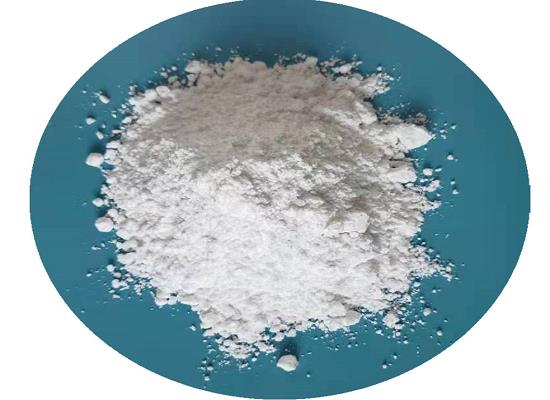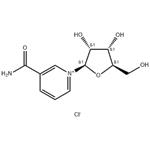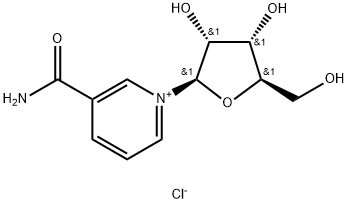Nicotinamide riboside chloride: biological activities and preclinical studies
Jan 24,2024
General Description
Nicotinamide riboside chloride is a compound that can enhance NAD+ levels in the body, which are critical for regulating metabolic processes. Preclinical studies have shown that Nicotinamide riboside chloride has a similar toxicity profile to nicotinamide, and clinical trials have demonstrated its safety and tolerability in various dosages and durations. Nicotinamide riboside chloride has potential benefits in improving the NAD metabolome, fatty liver, and exercise performance, and further research into its clinical applications is warranted.

Figure 1. Nicotinamide riboside chloride
Biological activities
Nicotinamide riboside chloride is a compound that has gained attention for its potential to enhance NAD+ levels in the body. NAD+ co-enzymes, including NAD+, NADH, NADP+, and NADPH, play critical roles in regulating various metabolic processes. They are involved in fuel oxidation, ATP generation, gluconeogenesis, ketogenesis, production of pentose phosphates, heme, lipids, steroid hormones, and detoxification of free radicals. NAD+ acts as a substrate for enzymes involved in ADPribose polymerization, cyclic ADPribose synthesis, and deacylation of protein lysine substrates by sirtuins. These processes are important for DNA damage repair, calcium ion mobilization, gene expression regulation, and protein post-translational modifications. While NAD+ can be produced from nicotinamide (NAM) or tryptophan de novo, the efficiency of these pathways is lower compared to the vitamin precursors nicotinic acid (NA), NAM, or Nicotinamide riboside chloride. Pellagra, a disease caused by NAD+ precursor deficiency, can be prevented or treated with NA, NAM, or tryptophan supplementation. Despite homeostatic mechanisms and dietary intake, NAD+ co-enzyme levels are continuously challenged by metabolic stress. Conditions such as overfeeding, type 2 diabetes, noise-induced hearing loss, heart failure, peripheral nerve damage, central brain injury, lactation, DNA damage, alcohol metabolism, aging, and chronic inflammation can compromise NAD+ levels. The expression of nicotinamide phosphoribosyltransferase (NAMPT), the enzyme involved in NAD+ salvage, also declines with aging and inflammation. Given the importance of NAD+ in metabolism, its role in mediating longevity benefits through sirtuins, and the impact of metabolic stress and aging on NAD+ levels, researchers are exploring whether higher intake of B3 vitamins, including Nicotinamide riboside chloride, could optimize health. Nicotinamide riboside chloride has shown promising results in increasing NAD+ levels in various tissues, protecting against metabolic stress-induced damage, enhancing sirtuin activity, and improving mitochondrial function. Ongoing studies aim to further investigate the safety and efficacy of Nicotinamide riboside chloride supplementation in humans. 1
Preclinical studies
Nicotinamide riboside chloride is a compound that has shown promising clinical applications. It has been evaluated in preclinical studies to assess its safety and toxicity levels. In these studies, a crystalline form of Nicotinamide riboside chloride called NIAGEN was tested. The results indicated that it had a similar toxicity profile to NAM (nicotinamide) at equimolar doses. It has also undergone clinical trials to further investigate its potential benefits. The initial trial confirmed the safe oral availability of single doses of Nicotinamide riboside chloride and demonstrated how it increases the human blood NAD metabolome. Another trial provided additional safety data for healthy individuals taking it for 8 days. Two other trials focused on its safety in healthy individuals, with one group taking 500 mg twice daily for 6 weeks and another group taking a combination of up to 500 mg and 100 mg pterostilbene per day for 8 weeks. The combination of Nicotinamide riboside chloride and pterostilbene was found to significantly elevate LDL-C (low-density protein cholesterol), but no significant increases in LDL-C were observed with it alone. Another trial examined the safety and tolerance of ingesting 2 grams of Nicotinamide riboside chloride per day for 12 weeks in obese men. Post hoc analyses suggested an improvement in fatty liver in the NRC-treated group. In a separate trial, single 500 mg doses were found to reduce markers of oxidative damage while increasing NADPH levels and exercise performance in older individuals. Overall, the clinical trials conducted to date have demonstrated the safety and tolerability in various dosages and durations. Additionally, Nicotinamide riboside chloride has shown potential benefits in improving the NAD metabolome, fatty liver, and exercise performance. 2
Reference
1. EFSA Panel on Nutrition, Novel Foods and Food Allergens (NDA), Turck D, Bohn T, et al. Extension of use of nicotinamide riboside chloride as a novel food pursuant to Regulation (EU) 2015/2283. EFSA J. 2021;19(11):e06843.
2. Conze D, Brenner C, Kruger CL. Safety and Metabolism of Long-term Administration of NIAGEN (Nicotinamide Riboside Chloride) in a Randomized, Double-Blind, Placebo-controlled Clinical Trial of Healthy Overweight Adults. Sci Rep. 2019;9(1):9772.
- Related articles
- Related Qustion
- What are the benefits of Nicotinamide riboside chloride supplement? What is the appropriate daily dosage? May 15, 2025
Nicotinamide riboside chloride (NRCl) is an FDA-approved nutritional supplement that can be used to increase NAD+ levels.
- Niacin vs Niacinamide vs Nicotinamide Riboside: what's the difference? Mar 21, 2024
Nicotinic acid, nicotinamide and nicotinamide riboside are the vitamin B3 precursors of nicotinamide adenine dinucleotide (NAD) in the human diet.
- Stability of Nicotinamide riboside chloride and chemical properties of its derivatives Nov 16, 2023
Nicotinamide riboside chloride (NRCl) is a potent form of vitamin B3. However, it cannot be used in ready-to-drink (RTD) beverages or high-water active foods due to its instability in water.
Supplementation with pyridoxal 5'-phosphate monohydrate can synthesize neurotransmitters such as dopamine and serotonin, maintaining a healthy nervous system.....
Nov 4,2025Biochemical EngineeringPyridoxal phosphate is a crucial coenzyme in biochemical reactions. It is synthesized through DXP-dependent and R5P-dependent pathways, with implications for therapeutics and health.....
Jan 24,2024APINicotinamide riboside chloride
23111-00-4You may like
Nicotinamide riboside chloride manufacturers
- Nicotinamide riboside chloride
-

- 2025-12-12
- CAS:23111-00-4
- Min. Order:
- Purity: 0.99
- Supply Ability:
- Nicotinamide riboside chloride
-

- $0.00 / 1KG
- 2025-12-12
- CAS:23111-00-4
- Min. Order: 1KG
- Purity: 97%min
- Supply Ability: 100KG
- Nicotinamide riboside chloride; NR-CL
-

- $0.00 / 1KG
- 2025-12-12
- CAS:23111-00-4
- Min. Order: 1KG
- Purity: ≥98% HPLC
- Supply Ability: 1000KG






